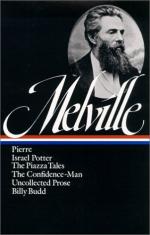Whichever way the eye turned, no tree, no speck of any green thing was seen—no more than in smithies. All laborers, of whatsoever sort, were hued like the men in foundries. The black vistas of streets were as the galleries in coal mines; the flagging, as flat tomb-stones, minus the consecration of moss, and worn heavily down, by sorrowful tramping, as the vitreous rocks in the cursed Gallipagos, over which the convict tortoises crawl.
As in eclipses, the sun was hidden; the air darkened; the whole dull, dismayed aspect of things, as if some neighboring volcano, belching its premonitory smoke, were about to whelm the great town, as Herculaneum and Pompeii, or the Cities of the Plain. And as they had been upturned in terror towards the mountain, all faces were more or less snowed or spotted with soot. Nor marble, nor flesh, nor the sad spirit of man, may in this cindery City of Dis abide white.
As retired at length, midway, in a recess of the bridge, Israel surveyed them, various individual aspects all but frighted him. Knowing not who they were; never destined, it may be, to behold them again; one after the other, they drifted by, uninvoked ghosts in Hades. Some of the wayfarers wore a less serious look; some seemed hysterically merry; but the mournful faces had an earnestness not seen in the others: because man, “poor player,” succeeds better in life’s tragedy than comedy.
Arrived, in the end, on the Middlesex side, Israel’s heart was prophetically heavy; foreknowing, that being of this race, felicity could never be his lot.
For five days he wandered and wandered. Without leaving statelier haunts unvisited, he did not overlook those broader areas—hereditary parks and manors of vice and misery. Not by constitution disposed to gloom, there was a mysteriousness in those impulses which led him at this time to rovings like these. But hereby stoic influences were at work, to fit him at a soon-coming day for enacting a part in the last extremities here seen; when by sickness, destitution, each busy ill of exile, he was destined to experience a fate, uncommon even to luckless humanity—a fate whose crowning qualities were its remoteness from relief and its depth of obscurity—London, adversity, and the sea, three Armageddons, which, at one and the same time, slay and secrete their victims.
CHAPTER XXVI.
FORTY-FIVE YEARS.
For the most part, what befell Israel during his forty years wanderings in the London deserts, surpassed the forty years in the natural wilderness of the outcast Hebrews under Moses.
In that London fog, went before him the ever-present cloud by day, but no pillar of fire by the night, except the cold column of the monument, two hundred feet beneath the mocking gilt flames on whose top, at the stone base, the shiverer, of midnight, often laid down.




